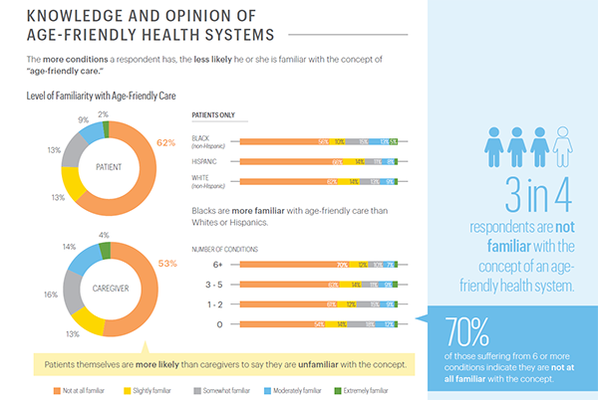New York, NY (October 29, 2019) – Care of older adults is mired in misinformation, with most older patients and caregivers mistakenly believing that sharp declines in the quality of life are inevitable, according to a new survey from WebMD and The John A. Hartford Foundation.
Driving Towards Age-Friendly Care for the Future, a survey of more than 2,700 patients and caregivers age 65 and older, found that nearly 40% of respondents don’t know that certain prescription medications can impact cognition and more than 40% incorrectly think that depression is an inevitable part of aging. More than two-thirds of caregivers said that the person in their care has difficulty walking around, and half said that they had fallen within the past year.
“Many older adults in the United States have a lower quality of life because they, and their care team, simply don’t know that there’s a more age-friendly pathway to health care,” said Terry Fulmer, PhD, RN, FAAN, President of The John A. Hartford Foundation. “We, as a society, have come to accept the downside of aging—including the impact of multiple, conflicting medications, cognitive decline, depression and mobility issues—rather than asking for care that helps us benefit from the positive aspects of our later years.”
Importantly, 3 in 4 older adults were not aware that they have the right to ask for, and receive, health care tailored especially to their needs and wants – a concept known as Age-Friendly Care – that could mitigate many of these problems and promote greater well-being among older patients. The release of the survey comes at a time when older adults represent 16% of the U.S. population, a rate that is expected to grow to more than 25% of all adults by 2060.
Age-Friendly Care is defined as care that is safe, high-quality, and based on what matters most to older adults as individuals, while promoting a better quality of life. The focus is on prioritizing the “4Ms” of care: what matters to patients, promoting mobility, ensuring medications don’t interfere with quality of life, and treating dementias, depression and other mentation-associated conditions.
The John A. Hartford Foundation, which focuses exclusively on improving care for older adults, is supporting a national movement with the Institute for Healthcare Improvement to help all U.S. hospitals and health systems provide age-friendly health care. WebMD is promoting awareness of age-friendly care through its partnership with the Foundation and by providing online information to consumers.
While encouraging health care systems to incorporate age-friendly care into their delivery models, the Foundation also aims to help patients and caregivers better understand, and ask for, age-friendly care. In the survey, a majority of older adults (70%) noted that having a checklist of questions to ask doctors and online resources that are focused on health topics for older adults (60%) would help them feel more comfortable requesting age-friendly health care.
“Caring for the aging population is among the most critical issues facing the nation today,” said John Whyte, MD, MPH, Chief Medical Officer, WebMD. “It is crucial that the entire health care system understands the challenges and works pro-actively to take them on. Together, WebMD and The John A. Hartford Foundation are committed to providing a brighter future for older adults, and this survey shines a light on some of the issues we must address.”
To go to the survey report, click here.
Learn More
